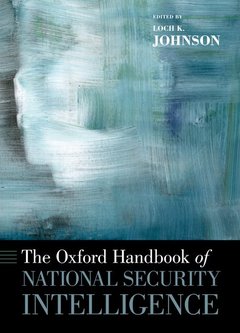The Oxford Handbook of National Security Intelligence Oxford Handbooks Series
Langue : Anglais
Coordonnateur : Johnson Loch K.

The Oxford Handbook of National Security Intelligence is a state-of-the-art work on intelligence and national security. Edited by Loch Johnson, one of the world's leading authorities on the subject, the handbook examines the topic in full, beginning with an examination of the major theories of intelligence. It then shifts its focus to how intelligence agencies operate, how they collect information from around the world, the problems that come with transforming "raw" information into credible analysis, and the difficulties in disseminating intelligence to policymakers. It also considers the balance between secrecy and public accountability, and the ethical dilemmas that covert and counterintelligence operations routinely present to intelligence agencies. Throughout, contributors factor in broader historical and political contexts that are integral to understanding how intelligence agencies function in our information-dominated age.
About the Contributors. Glossary. PART I INTRODUCTION. 1. National Security Intelligence. LOCH K. JOHNSON. 2. National Security and Public Anxiety: Our Changing Perceptions. SIR RICHARD DEARLOVE. PART II THEORY AND METHOD. 3. Theories of Intelligence. PETER GILL. 4. The Sources and Methods of Intelligence Studies. JAMES J. WIRTZ. 5. Getting Intelligence History Right: Reflections and Recommendations from the Inside. NICHOLAS DUJMOVIC. 6. Assessing Intelligence Performance. JOHN GENTRY. PART III THE EVOLUTION OF MODERN INTELLIGENCE. 7. The Rise of the U.S. Intelligence System, 1917-1977. MICHAEL WARNER. 8. The Rise and Fall of the CIA. RHODRI JEFFREYS-JONES. 9. British Strategic Intelligence and the Cold War. LEN SCOTT. 10. Signals Intelligence in War and Power Politics, 1914-2008. JOHN FERRIS. 11. The President's Intelligence Advisory Board. MICHAEL ABSHER, MICHAEL DESCH, and ROMAN POPADIUK. 12. Intelligence and Law Enforcement. FRED F. MANGET. 13. Evolution of International Collaboration in the Global Intelligence Era. A. DENIS CLIFT. PART IV INTELLIGENCE COLLECTION AND PROCESSING. 14. The Dilemma of Open Source Intelligence: Is OSINT Really Intelligence?. ARTHUR S. HULNICK. 15. The Troubled Inheritance: The National Security Agency and the Obama Administration. MATTHEW M. AID. 16. The Human Collection of Intelligence. FREDERICK P. HITZ. 17. United Nations Peacekeeping Intelligence. A. WALTER DORN. 18. Privatized Spying: The Emerging Intelligence Industry. PATRICK R. KEEFE. 19. Guarding the Border: Intelligence and Law Enforcement in Canada's Immigration System. ARNE KISLENKO. 20. Extraordinary Rendition. WILLIAM G. WEAVER aamp, ROBERT M. PALLITTO. PART V INTELLIGENCE ANALYSIS AND PRODUCTION. 21. Addressing alt,"Complexitiesagt," in Homeland Security. GREGORY F. TREVERTON. 22. The Intelligence Analysis Crisis. URI BAR-JOSEPH AND ROSE MCDERMOTT. 23. Competitive Analysis: Techniques for Better Gauging Enemy Political Intentions and Military Capabilities. RICHARD L. RUSSELL. 24. Decision Advantage and the Nature of Intelligence Analysis. JENNIFER SIMS. 25. Intelligence Analysis in an Uncertain Environment. WILLIAM M. NOLTE. 26. The Dilemma of Defense Intelligence. RICHARD A. BEST, JR.. PART VI INTELLIGENCE DISSEMINATION. 27. The Policymaker-Intelligence Relationship. MARK M. LOWENTHAL. 28. On Uncertainty and the Limits of Intelligence. PETER JACKSON. 29. The Perils of Politicization. PAUL PILLAR. 30. Leadership in an Intelligence Organization: The Directors of Central Intelligence and the CIA. DAVID ROBARGE. PART VII COUNTERINTELLIGENCE. 31. The Future of FBI Counterintelligence through the Lense of the Past One Hundred Years. RAY BATVINIS. 32. Treason: alt,"'Tis Worse than Murderagt,". STAN A. TAYLOR aamp, KAYLE BUCHANAN. 33. The Challenges of Counterintelligence. PAUL J. REDMAN. 34. Catching An Atom Spy: MI5 and the Investigation of Klaus Fuchs. TIMOTHY GIBBSPART VIII COVERT ACTION. 35. Covert Action, Pentagon Style. JENNIFER D. KIBBE. 36. Covert Action: United States Law in Substance, Process, and Practice. JAMES E. BAKER. 37. Covert Action: Strengths and Weak
Loch K. Johnson is Regents Professor and Josiah Meigs Distinguished Teaching Professor at the University of Georgia.
Date de parution : 05-2012
Ouvrage de 912 p.
24.6x17 cm
Thème de The Oxford Handbook of National Security Intelligence :
© 2024 LAVOISIER S.A.S.



